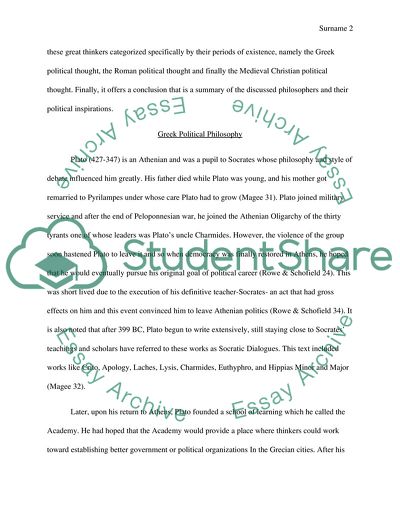Cite this document
(Political Theory of Greek, Roman and Medieval Christian Thinkers Coursework Example | Topics and Well Written Essays - 3250 words, n.d.)
Political Theory of Greek, Roman and Medieval Christian Thinkers Coursework Example | Topics and Well Written Essays - 3250 words. https://studentshare.org/politics/1847298-this-essay-is-to-exploreresearch-the-political-theory-of-greek-roman-and-medieval-christian-thinkers-special-concentration-is-placed-on-the-major-political-works-of-plato-aristotle-cicero-augustine-and-aquinas
Political Theory of Greek, Roman and Medieval Christian Thinkers Coursework Example | Topics and Well Written Essays - 3250 words. https://studentshare.org/politics/1847298-this-essay-is-to-exploreresearch-the-political-theory-of-greek-roman-and-medieval-christian-thinkers-special-concentration-is-placed-on-the-major-political-works-of-plato-aristotle-cicero-augustine-and-aquinas
(Political Theory of Greek, Roman and Medieval Christian Thinkers Coursework Example | Topics and Well Written Essays - 3250 Words)
Political Theory of Greek, Roman and Medieval Christian Thinkers Coursework Example | Topics and Well Written Essays - 3250 Words. https://studentshare.org/politics/1847298-this-essay-is-to-exploreresearch-the-political-theory-of-greek-roman-and-medieval-christian-thinkers-special-concentration-is-placed-on-the-major-political-works-of-plato-aristotle-cicero-augustine-and-aquinas.
Political Theory of Greek, Roman and Medieval Christian Thinkers Coursework Example | Topics and Well Written Essays - 3250 Words. https://studentshare.org/politics/1847298-this-essay-is-to-exploreresearch-the-political-theory-of-greek-roman-and-medieval-christian-thinkers-special-concentration-is-placed-on-the-major-political-works-of-plato-aristotle-cicero-augustine-and-aquinas.
“Political Theory of Greek, Roman and Medieval Christian Thinkers Coursework Example | Topics and Well Written Essays - 3250 Words”. https://studentshare.org/politics/1847298-this-essay-is-to-exploreresearch-the-political-theory-of-greek-roman-and-medieval-christian-thinkers-special-concentration-is-placed-on-the-major-political-works-of-plato-aristotle-cicero-augustine-and-aquinas.


